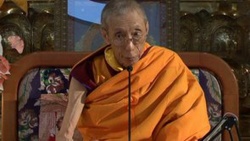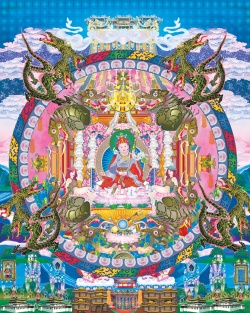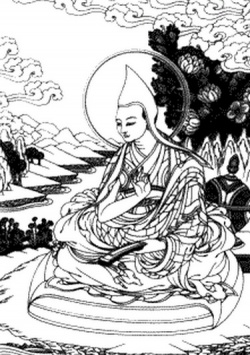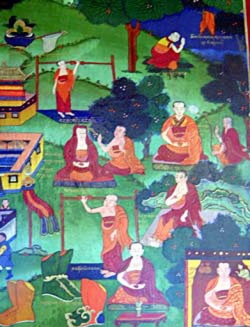Buddhism in Huxley's Evolution and Ethics
A note on a Victorian evaluation and its "comparativist dimension"
By Vijitha Rajapakse
Philosophy East and West
Volume 35, no. 3
(July 1985)
(C)by the University of Hawaii Press
British perceptions of Buddhism tended to be surprisingly vague during the early part of the nineteenth century. Even so reputed an "authority" on India at the time as James Mill, for example, does not appear to have known anything definite on the subject; his famous The History of British India (1818) incorporates some lengthy commentaries on India's cultural and intellectual achievements, but save for a bare reference, Buddhism, significantly, escaped his consideration. Evidently, James Mill, to all intents and purposes, viewed India as home to a single indigenous religion, Hinduism.(1) These perceptions, however, changed in due course, thanks to the advance of Oriental scholarship, especially Western research on Buddhist textual sources. It is perhaps worth noting in this connection that in an essay written in the 1850s, James Mill's son and disciple John Stuart Mill actually alluded to Buddhism's nirvanic ideal while trying to make a case for the this-worldly, antisupernaturalistic "Religion of Humanity" whcich both he and Auguste Comte (among others) regarded as a possible substitute for the West's old established creeds.(2) John Stuart Mill's grasp of Buddhism was no doubt rudimentary, but this allusion at least indicates that he had come to see it not only as a distinct religion but also as one which upheld some strikingly untypical standpoints. As these standpoints subsequently became better known, Buddhism won for itself more forthright admirers, both in Britain and also elsewhere in Europe. In a recent paper Christopher Clausen has indeed gone so far as to identify Buddhism "as the most appealing of non-Christian religions to the nineteenth century mind" and, in commenting on its overall impact, has observed that "as time went on, Buddhist terms and concepts became available for general use in moral, philosophical and religious discussion even by people who were not particularly attracted by the system as a whole."(3)
Evidently, this phenomenon exemplifies a particular kind of East-West contact in the sphere of ideas and values which took place in the last century. And there is, I think, a notable late Victorian context where its character and scope are interestingly epitomized. The context in question, to be sure, is T. H. Huxley's Evolution and Ethics, a work which originated in this highly versatile British scientist-thinker's Romanes Lecture, delivered at Oxford University in 1893.(4) Darwinian approaches--a profound and pervasive influence in the Victorian milieu--are very noticeable in the complex moral and philosophical discussion that is set forth here. And this work has, as a result, attracted a good deal of attention from those interested in contemporary intellectual history in particular.(5) But I do not think the excursus into Buddhist thought that it contains has
P.296
been closely scrutinized by anyone, especially with a view to bring into focus the innovative "comparativist dimension" it projects, for Huxley indeed sought on occasion to juxtapose Buddhist and Western philosophical ideas. I propose in what follows to remedy this neglect.
Of course, Buddhism was not a field in which Huxley could claim expert, firsthand knowledge; still, it would be well to bear in mind that his brief evaluation of this religion cannot be dismissed as a purely amateurish effort. In a passing yet noteworthy remark, Mrs. Rhys Davids has called it the "most remarkable contribution of any lay student to the philosophy of Buddhism,"(6) This tribute is not undeserved, considering Huxley's time and background. I think one may fairly say that Huxley's evaluation of Buddhism has first of all a historical significance; but what it highlights to the modern reader is, more than anything else, an East-West philosophical contact of a striking nature. Its importance from this angle is perhaps enhanced by the comparative intent that enlivens his clarification of certain basic Buddhist notions. The parallelisms that Huxley draws between Buddhist and Western philosophical approaches are not, as will be seen later, beyond criticism; yet this procedure--the use of analogies and parallels drawn from Western thought as aids in the exegetical process--has a considerable significance of its own. For Huxley might be said to bear witness here to an early inchoate attempt to engage in the kind of investigation that nowadays goes under the name of comparative philosophy. Victorian Buddhism, it would thus appear, could be associated not only with the origins of comparative religion, as Clausen(7) has indeed shown, but also with the origins of compara-philosophy. However, it would be appropriate now to leave these preliminaries aside and turn to our subject itself.
II
T. H. Huxley was a paleontologist with a medical background who gained great prominence in the nineteenth century as one of the foremost defenders of Darwin's evolutionary theory. Victorians were often inclined to see him as "the living embodiment of science militant,"(8) for Huxley actually clashed with contemporary defenders of Biblical supernaturalism in the name of science.(9) A very late product of his intellectual career, Evolution and Ethics (1893) shows him in a mellowed, reflective mood. The radical disjunction between the ethical and the cosmic processes such as is frequently highlighted here hardly squares with "orthodox" Darwinism; in fact Irvine has called Huxley's effort in this context a "somewhat puzzling manoeuvre" that is "full of talk about Indian mysticism and of protest about the cruelties of evolution."(10) Yet his overall treatment of his theme is not a matter that need concern us now.(11) What must be noted, on the other hand, is that in the course of his professed endeavor to inquire into the origin and the basis of ethical values from an evolutionary standpoint, Huxley indeed undertook a brief survey of the leading philosophies that had helped to form mankind's conceptions of such values. He emphasized in this connection
P.297
that India had engendered a distinctive outlook on life, and some of the ideas central to that outlook (as, for example, karman) actually made a notable impression on him. But it is upon a particular religion of Indian origin, namely Buddhism, that he chose to dwell at length and, I think, in a way that merits close attention.
How did Huxley regard Buddhism? His overview of this religion's standpoints and the estimate of its impact on civilization came towards the close of his evaluative remarks set forth in the Evolution and Ethics. But for purposes of our present inquiry it is perhaps best to note them at the outset, for the undertone of admiration one recognizes here indeed reflects the positive reception accorded to Buddhism in certain Victorian circles. Buddhism was, Huxley said:
A system which knows no God in the Western sense; which denies a soul to man; which counts the belief in immortality a blunder and hope of it a sin; which refuses any efficacy to prayer and sacrifice; which bids men look to nothing but their own efforts for salvation; which in its original purity, knew nothing of vows of obedience, abhorred intolerance, and never sought the aid of the secular arm; yet spread over a considerable moiety of the Old World with marvellous rapidity, and is still, with whatever base admixure of foreign superstitions, the dominant creed of a large fraction of mankind.(12)
He paused to consider some of the details relating to this religion in a more measured manner. Huxley quite rightly looked upon Buddhism as a system which had developed against the background of the "prevalent Brahmanical doctrine."(13) Moreover, he was mindful of the fact that there was much common ground between these two historic religions of India. He nevertheless pointed out that the Buddha had stepped out of the bounds of Brahmanical orthodoxy and infused new ideas into Indian religious thinking. And he not only went to some lengths in emphasizing these new ideas but also sought to make them more "intelligible" by drawing attention to similar ideas and approaches that are found in Western thought.(14) The parallelisms identified in this connection are not without significance. But what is most noteworthy, it would be well to reiterate, is the underlying procedure, namely, the innovative tendency to link Eastern and Western ideas. For this, I believe, marks one of the less remembered yet interesting beginnings of comparative philosophy.
In any event, the "new ideas" which attracted Huxley's particular attention were those that are crucial to the understanding of Buddhism's distinctive philosophical orientation vis a vis not only Hinduism but all other traditional systems as well. Not surprisingly, he found Buddhism's opposition to the doctrine of substance to be rooted in one such idea of great importance, and hence sought to clarify its implications in some detail. "The earlier forms of Indian philosophy." he observed, "agreed with those prevalent in our own times in supposing the existence of a permanent reality or 'substance' beneath shifting series of phenomena whether of matter or mind."(15) Huxley recognized clearly that the repudiation of substantiality was an issue over which Buddhist teachings
P.298
clashed with those of the Hindus, and again with the theories of traditional Western metaphysics. More important still, he did not fail to point out that in dispensing with the notion of an abiding essence, whether cosmic or individual, the Buddha had added a new dimension to philosophic reflection. Huxley was particularly impressed by the Buddha's denial of a soul-substance. It had in his view far-reaching implications; indeed, he went so far as to characterize the denial in question as "a metaphysical tour de force of great interest to the student of philosophy, seeing that it supplies the wanting half of Berkeley's well-known idealistic argument."(16)
This remark highlights Huxley's evident desire to link a distinctive feature in Buddhist philosophical attitudes with a particular phase in the development of British empiricism. Though only Berkeley is actually mentioned, what he no doubt wanted to emphasize was that the Buddhist critique of substance was wider, more penetrating and consistent than Berkeley's famous attack on the Lockean concept of substance.(17) For a characteristic feature of Buddhist thinking is indeed the rejection of substantiality in a total sense--including very strikingly any hint of it in the psychical realm. Accordingly, the Buddha emerged in Huxley's evaluation as a philosophical analyst of greater subtlety than Berkeley. While he argued against the "substance of matter," Berkeley, Huxley pointed out, failed to realize that "the non-existence of a substance of mind is equally arguable" and, furthermore, that the consistent application of empiricist principles finally led to the reduction of everything to "co-existences and sequences of phenomena, beneath and beyond which there is nothing cognoscible."(18) Now this was very much the Buddhist position, and it was also the position towards which Hume subsequently developed British empiricism.(19) Interestingly enough, the parallelisms that exist between Buddhist and Humean standpoints on the question of a substantial soul were duly noted by certain early commentators on Buddhism. Mrs. Rhys Davids, for example, remarked that "with regard to the belief in an indwelling spirit or ego, permanent, unchanging, unsuffering, Buddhism took the standpoint two thousand four hundred years ago of our own Hume of two centuries ago".(20) And recently, comparativists have of course sought to delve thoroughly into these parallelisms.(21) Thus a point Huxley may well have emphasized is that the Humean position was to all intents and purposes foreshadowed in Buddhism. Yet he did not do so. What struck him instead was the Buddha's analytical acumen vis a vis Berkeley. "It is," Huxley affirmed, "a remarkable indication of the subtlety of Indian speculation that Gautama should have seen deeper than the greatest of modern idealists." But he added at the same time: "though it must be admitted that, if some of Berkeley's reasonings respecting the nature of the spirit are pushed home, they reach pretty much the same conclusion."(22)
Though it encompasses a philosophical dimension, Buddhism of course is a soteriological doctrine. Its philosophical statements are spiritual in orientation, and their roots are to be found in meditational and related esoteric experiences
P.299
acquired in the course of a quest for salvation. This, however, is not a point that Huxley seems to have quite appreciated. For viewing the Buddhist thinking on substance much like a "theory" in the Western sense, he boldly proceeded to spell out its consequences. According to him, the Buddhist stance on substance led to an extreme form of phenomenalism, and its implications, he suggested, are finally unsettling. Thus he said:
Gautama proceeded to eliminate substance altogether; and to reduce the cosmos to a mere flow of sensations, emotions, volitions and thoughts, devoid of any substratum. As on the surface of a stream of water, we see ripples and whirlpools, which last for a while and then vanish with the causes that gave rise to them, so what seem individual existences are mere temporary associations of phenomena circling round a centre, "like a dog tied to a post". In the whole universe there is nothing permanent, no eternal substance either of mind or of matter. Personality is a metaphysical fancy; and in very truth no only we, but all things in the worlds without end of the cosmic phantasmagoria, are such stuff as dreams are made of.(23)
Most students of Buddhist philosophy, I am sure, might not concede that a virtual metaphysical reductio ad absurdum of this kind is really entailed by the anattan doctrine even at the purely intellectual level. But given Huxley's linkage of Buddhism with Berkeley (the proponent, in his view, of an idealistic system who showed a penchant for phenomenalistic analysis) , and again given his readiness to credit the Buddha with having "seen deeper than the greatest of modern idealists,"(24) this particular assessment, though perhaps mistaken in its final details, is I think nevertheless not surprising.
In any event, Huxley, it must be observed, did not consider Buddhist thinking to be unique solely because of the new interpretation it gave to the idea of substance. The pre-Buddhist approaches to salvation that held sway in India, he noted, were commonly predicated on a strong reliance on the need to mortify the flesh.(25) "With just insight into human nature," the Buddha, Huxley remarked, never prescribed extreme ascetic practices. Buddha's followers, he found. overcame passions and appetites through the steady cultivation of moral virtues--"by universal benevolence; by return of good for evil; by humility; by abstinence from evil thought...."(26) Again, the egalitarianism which Buddhism upheld in a caste-ridden social setting did not escape Huxley's implicit admiration. "Gautama," he declared:
refused to recognize any distinction, save that of perfection in the way of salvation, among his followers; and by such teaching no less than by the inculcation of love and benevolence to all sentient beings, he practically levelled every social, political and racial barrier.(27)
And lastly, there was the highest reach of Buddhist perfection, a goal epitomized in a word which was quite alien to Western religious ideas, namely, nirvaa.na. Huxley, understandably enough, sought to dwell briefly on its possible meaning and implications. Now this was a matter over which some of Huxley's
P.300
contemporaries disputed, often with little evidence of relevant knowledge; quite a few of them indeed contended that nirvaa.na signified annihilation pure and simple.(28) Seeking to judge what is at issue here in the light of the Oriental research with which he had come into contact,(29) Huxley on the other hand found "the acme of Buddhistic philosophy" beyond conception and description, though this to his way of thinking "comes to exactly the same thing as annihilation."(30) Interestingly enough, he added, however, that it was not "annihilation in the ordinary sense," for the abolition of pain and sorrow envisaged in nirvaa.na is actually regarded by Buddhists as a positive bliss, and the followers of this religion, he said, are greatly inspired "with an ecstatic desire to reach it."(31)
Needless to say, Huxley can be hardly credited with having quite succeeded in gaining a true insight into the religious import of nirvaa.na. Nevertheless, his openminded effort to understand its meaning must not, I think, go unnoticed; Huxley's perceptions here were somewhat ahead of those of John Stuart Mill.(32) Huxley's evident tendency to link Buddhist thought with Western ideas, which comes to the fore strikingly in his comments on the concept of substance, was further exemplified at other levels of his discussion as well. He found the nontheistic stance taken by the early Buddhists to be analogous to the outlook of Heracleitus and referred, in addition, to "many parallelisms of Stoicism and Buddhism," pointing in particular to a notion common to the two systems, namely, that of craving, designated in Buddhism as ta.nhaa. Perhaps more significant, he even ventured to indicate the possibility of clarifying certain Buddhist stances in terms of models that science offers. The transmission of karman between individual existences conceived as egoless phenomenal associations is a point to which he briefly alluded in this connection. This, he suggested, is something that might be understood after the manner of the communication of magnetic induction from one medium to another.(33)
Though Huxley tended for the most part to view Buddhism in a remarkably positive light, his evaluation nevertheless included a somewhat implicit (yet very striking) note of criticism. This, interestingly, emerged in the course of a comment on renunciation. Being a secular thinker whose mind was formed by the study of the sciences, especially evolutionary biology, Huxley, it appears, entertained certain misgivings about the viaibility of Buddhism's call for renunciation and the suppression of worldly desires it entails. This call, of course, acquires meaning against the background of a commitment to a higher, transcendent quest, and it is, needless to say, outside the purview of secular, scientifically oriented thinking. Hence, not surprisingly, what Huxley observed in Buddhist renunciation was simply its contrariety to man's natural instincts. For "worldly self assertion," he said, is "the essence of the cosmic process".(34)
In any event, such then are the main features of the evaluation of Buddhism which Huxley incorporated into his discussion in Evolution and Ethics. True, it is brief, limited in scope, and as indicated above, contains certain questionable judgments. Still, this evaluation provided by an eminent Victorian is very notable
P.301
because of the attitudes and perceptions it projects. And the "comparativist dimension" it reveals serves, I think, to enhance its overall significance. In closing the present phase of our inquiry I should, I believe, mention that though it was not a matter that Huxley himself chose to point out, his thinking on the overall nature of evolution nevertheless admits of some comparison with Buddhist views. Impermanence and suffering, he held, are the obvious attributes of the cosmic process.(35) Of course Buddhism also considers these same attributes (which it designates as anicca and dukkha) to sit at the very heart of the scheme of things within sa^msaara. The Buddhist Weltanschauung, however, recognizes a third "sign" in the cosmic process, namely, the absence of any substantial realities (anattan). And this, it must be remembered, is a position that impressed Huxley greatly because of its affinities to the results of Western empirical analyses.
III
What can the philosophically minded modern reader learn from the evaluative comments on Buddhism that are set forth in Huxley's Evolution and Ethics? I shall next offer a few reflections which might go some way towards answering this very pertinent question.
Though Huxley was not prepared to endorse Buddhist teachings in their entirety, he no doubt saw certain commendable features in them. Now the features he admired greatly in this religion appear to be those that serve to give it a distinctly humanistic character. I think Huxley would hardly have found any difficulty in going along with Silvain Levi's representation of Buddhism as a system which sustains three basic humanistic values--sagesse, douceur, pitie (wisdom, Enetleness, and compassion).(36) However, the attraction Huxley sometimes evinces for Buddhism also highlights something of particular interest to the comparativist, namely, the existence of an area of common ground between antisupernaturalist, critical, and empirical modes of thought manifesting in the West and some notable approaches of Buddhist philosophy. The recorded reactions to Buddhism on the part of such other nineteenth-century secular thinkers as John Stuart Mill (cited at the beginning of this paper) and also Nietzsche(37) indeed tend to bear this out further. Moreover, Huxley's readiness to take Buddhist ideas into serious account in the course of a general intellectual discussion shows that by about the latter part of the nineteenth century Buddhism had had an impact on the reflective circles in the Victorian milieu. All in all, his evaluation I think served to establish two things not much recognized in the nineteenth century, though better known to us: (i) Buddhism is a religion which incorporates a notable philosophical dimension, and (ii) some of the standpoints of this religion admit of comparison with Western ideas--especially those rooted in empirical thought.
Evidently, the deeper commitments of Buddhist living--its ideal of rennuciation in particular--did not appeal to Huxley. What this indicates is in turn not
P.302
without significance: though there are some points of contact between Western secular thought and Buddhism, the latter as a soteriological system embraces highly distinctive attitudes and emphases. And these, needless to say, remain permanently alien to secular thought.(38) There is yet another matter that touches on Huxley's evaluation as a whole which deserves brief mention here. A modern reviewer can hardly overlook the fact that it was on the conceptual principles implicit in Buddhist textual sources--rather than the practical form this religion assumes among actual believers--that he sought to focus particular attention.(39) Though he did not say so, Huxley indeed seems to have acted on the presumption that one should, in the course of scholarly inquiry abstract, so to say, the philosophical substratum of the Buddhist religion and make that the object of analysis and comment. Such nonsociological, "intellectualist" approaches to the study of Buddhism were frequently adopted by Orientalists in Huxley's time and after. Monier Williams,(40) for example, went to some lengths in actually advocating something like it. One must recognize, however, that the adequacy of "intellectualist" approaches is increasingly being questioned today.(41) Yet Huxley, I think, shows that they can be illuminating in their own way, It should be remembered that his identification of certain affinities between Buddhism and Westen thought was the outcome of a focusing of attention on and a preoccupation with this religion's informing ideas. And a knowledge of such ideas of course comes preeminently from a probing of Buddhist texts (or studies made on them) rather than an examination of popular religious behavior associated with Buddhism.
Huxley's estimate of Buddhism and his pioneering (though inchoate) thoughts about its relationship to certain Western views and ideas deserve to be remembered above all as an East-West philosophical encounter, Still it would be in place to reiterate finally that his interest in this Oriental religious system becomes even more noteworthy when both his standing as a leading Victorian intellectual and the nascent state of contemporary Buddhist scholarship are taken into account. Indeed, the excursus into Buddhism seen in the discussion in the Evolution and Ethics represents a Victorian evaluation founded on a perusal of Victorian literature on Buddhism.(42)
NOTES
1. In Tact, in his very revealing reference (which occurs in the index to The History of British India, 5th ed. (London, 1858), vol. 1,pp. 250-251, and the entry under "Buddha") , James Mill indentified the Buddha as "one of the incarnations of Vishnu." Buddha, he also acknowledged, was "worshipped over a great part of the East," but, notably enough, he was of the view that the question whether his religion was derived from Brahma or that of Brahma from him was difficult of solution
2. See "The Utility of Religion," in J. S. Mill. Three Essays on Religion (London, 1874), p. 121. Repeating a then widespread view, which of course Buddhists themselves do not favor, Mill interpreted their religion's highest goal (nirvaa.na) simply as annihilation. Still, far from decrying Buddhism on this account (as often happened in nineteenth-century Western circles), he held it forth
P.303
as a prime example which proved the viability of belief systems that excluded the conventional idea of personal immortality. Cf. G. Welbon, The Buddhist Nirvana and Its Western Interpreters (Chicago, Illinois: University of Chicago Press, 1968) ; hereafter cited as Welbon, Buddhist Nirvana.
3. Christopher Clausen, "Victorian Buddhism and the Origins of Comparative Religion," Journal of Religion and Religions 5 (1975): 13; hereafter cited as Clausen, "Victorian Buddhism."
4. The edition used in the sequel is Evolution and Ethics, 1893-1943, by T. H. Huxley and Julian Huxley (London: Pilot Press, 1947); hereafter cited as Huxley, Evolution and Ethics. In addition to the text of Huxley's lecture and the introduction to it, which he wrote subsequently under the title "Prolegomena," this edition also contains interesting critical and retrospective observations on both these compositions by Julian Huxley, the noted twentieth-century biologist.
5. Cf. William Irvine, Apes, Angels, and Victorians (The Story of Darwin, Huxley and Evolution) (New York: McGraw-Hill, 1963) , pp. 423-428, hereafter cited as Irvine, Apes, Angels, and Victorians.
6. Mrs. Rhys Davids, Buddhism--A Study of the Buddhist Norm (London, n.d.) , p. 117. note; hereafter cited as Davids, Buddhism.
7. Clausen, "Victorian Buddhism."
8. Irvine, Apes, Angels, and Victorians, p. 284.
9. The famous Huxley-Wilberforce debate, and such writings as Science and the Hebrew Tradition and Science and the Christian Tradition, vols. 4 and 5 of Collected Essays (London: Macmillan and Co., 1901-1902) , as well as his enunciation of "agnosticism" as a distinctive stance in religion are especially noteworthy in this connection. For details relating to Huxley's career and achievements, set Leonard Huxley, The Life and Letters of Thomas Henry Huxley (New York: D. Appleton, 1913), 2 vols. Cf. Albert Ashforth, Thomas Henry Huxley (New York: Twayne Publishers, 1969), and A. O. J. Cockshut, The Unbelievers; English Agnostic Thought, 1840-1890 (New York: New York University Press, 1966), chap. 6 ("T. H. Huxley, Scientific Sage")
10. Irvine, Apes, Angels, and Victorians, pp. 428-429.
11. For some relevant thoughts on this, see John Dewey, "Evolution and Ethics," The Monist 8 (1897 - 1898).
12. Huxley, Evolution and Ethics, p. 74.
13. Ibid.,p.72.
14. Ibid., p. 93, note 8. The relevance of comparison to the task of Buddhist exegesis is broached here.
15. Ibid., p. 70.
16. Ibid., p. 72.
17. For details concerning Berkeley's views see his Principles of Human Knowledge (1710), especially sections 14 and 91. Cf. G. J. Warnock, Berkeley (London: Penguin Books, 1953), pp. 93 ff.
18. Huxley, op. cit. p. 72.
19. See Hume's A Treatise of Human Nature (1739), especially bk. 1, pt. 4. Cf. A. H. Basson, Hume (London: Penguin Books, 1958), pp. 126 ff.
20. Davids. Buddhism, p. 79. It is noteworthy that T. W. Rhys Davids' Hibbert Lectures, 1881 (London: Norgate & Williams, 1881) (one of the acknowledged souces of Huxley's own evaluation of the religion, as will be shown below), refer in passing (pp. 125, 155) to certain general resemblances in the outlooks of the Buddha and Hume. One would do well to remember also that Huxley was the author of a survey of both Hume's and Berkeley's philosophies, namely Hume, with helps to the Study of Berkeley (London, 1894).
21. Cf. Nolan Pliny Jacobson, Buddhism, Religion of Analysis (New York: Humanities Press, 1966). chap. 8; also the same author's "Gotama Buddha et David Hume," Revue Philosophique de la France et l'Etranger, vol. 156(1966).
22. Huxley op. cit., p. 72.
23. Ibid. pp. 72-73.
24. Ibid. p. 72.
25. Ibid. pp. 71-72.
26. Ibid. pp. 73-74.
27. Ibid. p. 94, note 10.
28. See G. Welbon, Buddhist Nirvana, for interesting background information on this question.
29. The sources from which Huxley derived his knowledge of Buddhism will be identified in the third section of this paper.
P.304
30. Huxley, op. cit., p. 73. Also p. 94, note 9.
31. ibid., p. 94, note 9.
32. Cf. note 2, preceding.
33. Huxley, op. cit., p. 90, note 7, p. 73.
34. Ibid., p. 74. It is again somewhat striking, however, that Huxley did not follow Nietzsche and characterize Buddhism as a nihilistic creed. Cf. Max Ladner, Nietzsche und der Buddhismus (Zurich, 1933), and R. Rudolph, "Nietzsche, Buddhism, Nihilism and Christianity," Philosophy Today 13 (1969).
35. Huxley, op. cit., pp. 62, 63.
36. See Levi's essay, "Humanisme Buddhque," in his book L'Inde et le Monde (Paris, 1928), p. 59.
37. Cf. Nietzsche's Der Antichrist (1888). Here (sections 20-23) Buddhism was identified as the only truly positivistic religion in history, and also as one which was more realistic than Christianity, though, as noted above, Nietzsche tended to view it finally as being nihilistic in its overall character.
38. In this connection it is worth noting that Irvine (Apes, Angels, and Victorians, p. 426) was indeed of the view that "though full of admiration for the almost scientific method with which Buddha treats moral phenomena, Huxley cannot sympathize with what seems the ultimately negative character of his system. That life is a dream that man's object should be to end that dream by deadening desire and sensation [sic.], no sound Victorian could grant."
39. The suggestion that latter-day Buddhism is contaminated with "a base admixture of foreign superstitions" (an idea broached in Huxley's overview of the religion given on p. 74, and quoted in section II of this article) is very revealing in this connection, and deserves to be borne in mind.
40. See M. Monier-Williams, Buddhism (London, 1890) , pp. 149, 151, 162. Cf. Charles Eliot, Hinduism and Buddhism (London: E. Arnold & Co.), pp. xciii-xciv.
41. For a very recent statement of this position see Steven Collins, Selfless Persons, Imagery and Thought in Theravada Buddhism (Cambridge: Cambridge University Press, 1982), pp. 13 ff. Collins takes the view that Buddhism of the scriptual tradition must be considered and interpreted against the background of the rituals and the symbolism that enter into popular Buddhist belief, for the two are "interlinked through social relations" in ways little known to the "student of texts" (p. 15). Cf. R. F. Gombrich, Precept and Practice (Oxford, 1971).
42. Huxley noted (op. cit. p. 87, note 4) significantly that "for what I have said about Indian Philosophy, I am particularly indebted to the luminous exposition of primitive Buddhism and its relations to earlier Hindu thought, which is given by Prof. Rhys Davids in his remarkable Hibbert Lectures, 1881, and Buddhism (1890) . The only apology I can offer for the freedom with which I have borrowed from him in these notes is my desire to leave no doubt as to my indebtedness. I have also found Dr. Oldenberg's Buddha (Ed. 2, 1890) very helpful." The last-named work is a translation of the German original by Hermann Oldenberg, Buddha, Sein Leben, Seine Lehre, Seine Gemeinde (Berlin, 1880) . Its sometimes negative assessments of Buddhist ideas have been regarded as one of the sources of Nietzsche's harsher judgments on the religion, for Oldenberg was widely read in the nineteenth century. Cf. F. Mistry, Nietzsche and Buddhism (Berlin and New York, 1981), p. 114. The less appreciative or inaccurate aspects of Huxley's evaluation (on nirvaa.na, renunciation) might be perhaps linked again to Oldenberg's influence. Rhys Davids, on the other hand, gave a more balanced and informed account of Buddhism; the overall soundness of Huxley's own treatment of the subject in the Evolution and Ethics I think is in large measure reflective of this British Orientalist's mature interpretations of Buddhism.














